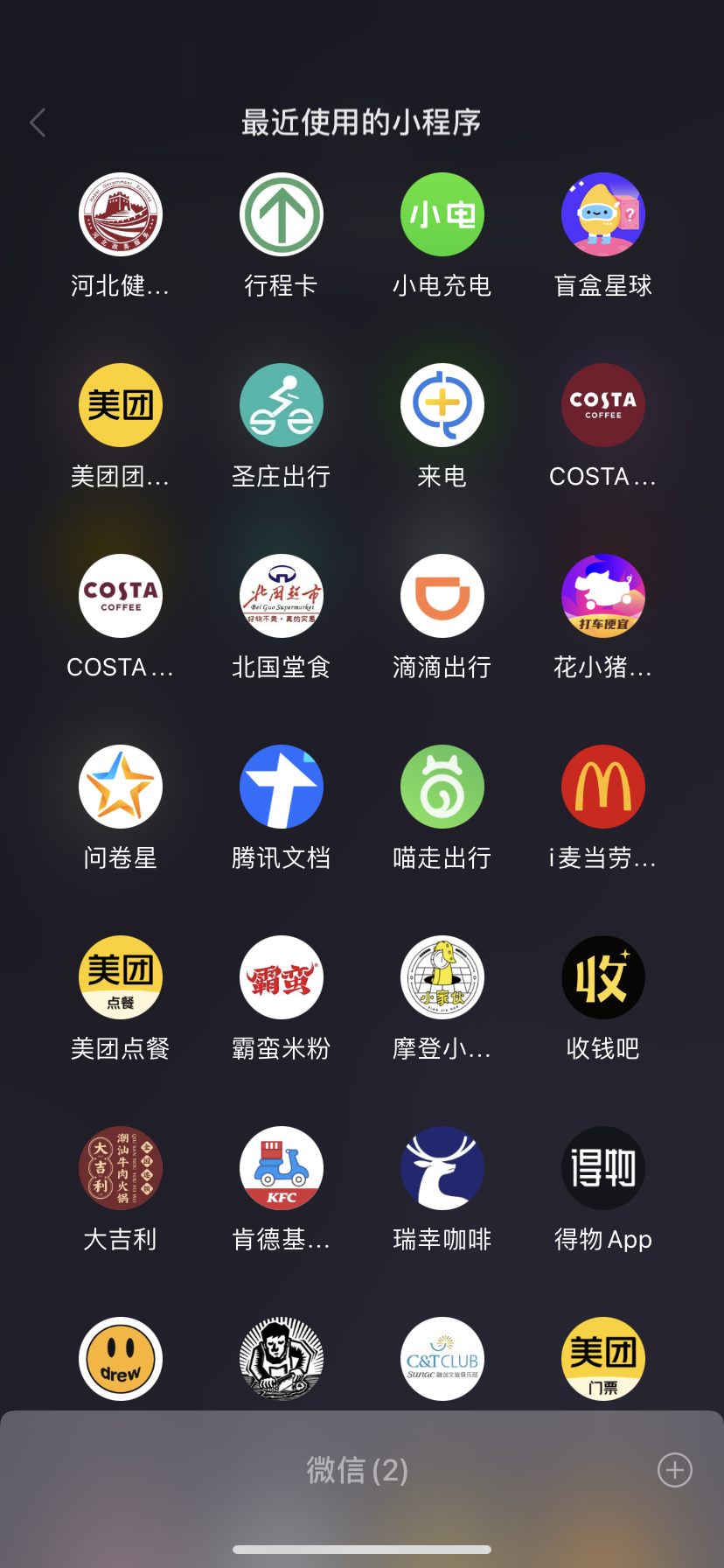
Introduction:
It is unquestionable that data and platform effect for people’s life. Data is a changeable digital framework that connects individuals with goods and services, and establishes a powerful virtual social group through data analysis. The data will be used by the platform to analyze personal information, interests and hobbies, so as to obtain more and more information and use this information for sales to improve productivity. And now the platform has become an inaccessible part of human life because of data. This article will analyze the WeChat platform with the largest amount of social data in China today. In WeChat (Plantin & Seta), we witnessed an extremely fast-moving infrastructure platform in China (Plantin et al., 2018). WeChat has a high status in China’s Internet platforms, and WeChat combines all the functions of Facebook, Instagram , and even walkie-talkies. This article will conduct research and analysis on the WeChat platform, mainly from the areas of WeChat’s main business, whether the business i s successful, and what activities the company makes money from.
1 what is WeChat?
WeChat is a social software first launched by Tencent on January 21, 2011. Users can send instant messages through voice, video, text, pictures, etc. And people can log in WeChat by mobile phones, tablets, Ipad and web pages. At the same time, WeChat provides public platforms, Moments of Friends, and messages. Push and other functions, users can add friends and follow the public platform by “shaking”, “searching number”, “people nearby”, scanning the QR code, and sharing the content with friends on WeChat and showing the excitement that users see Share the content to WeChat Moments.
WeChat is one of Tencent’s many products, integrating social interaction, e-commerce, payment and O2O functions (Zhu, 2018, p. 36). As a new type of mobile network social media platform, WeChat has gradually integrated into people’s lifestyles, and even triggered changes in the Chinese media industry. As an amazing product with far-reaching social and economic impact, WeChat has cultivated the largest ecology in the mobile Internet (Zhu , 2018, p. 33).
What activities does WeChat make money from?
1 advertisement
WeChat can make money by advertising to some businesses. WeChat can place advertisements through hyperlink mini-programs to make it easier for people to purchase and bring a positive advertising effect, and to obtain a certain amount of income by charging third-party fees. For example, PopMart (a toy manufacturer from China, mainly known for producing blind boxes) placed an advertisement on WeChat that was purchased by nearly 200,000 people within an hour.

2 Value-added service fee
WeChat’s value-added services are mainly charged by ordinary users and platform users. For example, for ordinary users, a certain fee is charged when ordinary users want to transfer money from change to bank cards. In addition, paid stickers are also a way for WeChat to explore value-added services.
3 Game revenue
WeChat introduces games into social elements, creating income through the interaction between friends who play games and the exchange of life credits, and in-game purchases have become their source of profit (Yu et al., 2017, p. 40). Users can play games through small programs or game centers to spend their time.
4 Mini Program Platform or Official Account
Mini Program is a platform provided by WeChat for other platforms. It can also be called a third-party user platform. Third-party users can register for WeChat store for online sales. Due to the large user scale of WeChat users and the high degree of user adhesion, it can provide sufficient traffic protection for third-party platforms to promote economic sharing. This is like renting a house in real life, where a third-party user sells it in the WeChat mall by paying rent. Many third-party platform users are also attracted by WeChat, such as Didi Chuxing, JD Shopping, and Meituan.
Is WeChat successful? What caused the success of WeChat?
There is no doubt that WeChat is very successful in China. According to 2016 statistics, WeChat has covered more than 94% of China’s smartphones, and monthly active volume has reached 806 million users, covering more than 200 countries and more than 20 languages. In addition, various brands The total number of WeChat public accounts of the company has exceeded 8 million, the number of mobile application docking has exceeded 85,000, and the advertising revenue has increased to 3.677 billion yuan. WeChat payment users have reached about 400 million.
There are many reasons for the success of WeChat, but those two reason are main reason.
1 Simple and convenient product
In WeChat (Plantin & Seta), we witnessed an extremely fast-moving infrastructure platform in China (Plantin et al., 2018). Users can easily and conveniently transmit their own information through text, stickers, voice, video, photos, location sharing , file sharing and other methods. In addition, users can also publish their own life dynamics or learn about friends’ life dynamics through the same function as Instagram through Moments.
2 Diversified functions
1) WeChat Pay (QR code) has gradually replaced cash in China. WeChat Pay and Alipay have gradually replaced cash. Users only need to scan the QR code to pay, thus forming a mobile payment model that enables WeChat Pay to truly integrate into daily life and complete the virtual world. Perfect integration with the real world. In addition, there are payment methods such as WeChat red envelopes and transfers. This payment method is mainly used for payment when users know each other. WeChat red envelopes are used for small -amount transfers for up to 200 yuan, while WeChat transfers are used for large-amount transfers between friends.

2) The WeChat Mini Program is a platform for third-party users and mini games. Users can spend leisure time through mini games, read books, listen to music, etc., or complete online shopping in the mini program.
3) The official account is mainly used for business users, news dissemination, hospital appointments, and water and electricity recharges. Ordinary users can learn real-time information and make appointments with daily life through the official account.
These diversified functions have greatly increased people’s quality of life, and only Alipay can compete with WeChat among platforms that integrate diversified functions. However, Alipay is not as good as WeChat in sending real-time information and user stickiness.
The Disadvantages of WeChat
But WeChat will violate certain user privacy, because China’s social media platforms are completely under government supervision.In the context of ubiquitous government supervision and intervention in China, platformization has created a series of problems and problems that are different from those in the West.Shockingly, they felt that they were under any surveillance–In China, they have nothing to hide. (De Kloet, 2019).Similarly , we need to critically ask about platform society and “global capitalism”, which is theorized as “platform capitalism” (Srnicek, 2016). In August 2020, President Trump issued an executive order banning WeChat, citing the Emergency Economic Power Act and the National Emergencies Act (Lyons, 2020). On the grounds that WeChat’s supervision system violated users’ privacy rights.
In conclusion, WeChat has developed a perfect system, and mobile Internet is going deep into China’s social life. It is obvious that the Internet has changed the way of life of Chinese consumers (Zhu, 2018, p. 45). In addition, the innovative functions brought by WeChat are also improving our lives and changing the way of communication in traditional communities. People’s basic life needs can be achieved through the Internet. It can be said that China’s economic growth is closely related to WeChat, so WeChat has been successfully realized. The traditional life is like a perfect transformation of mobile network life. “The Chinese Internet is huge, It is her Internet, which is different from the Internet in other places. “(Herold and deseta)
Reference:
de Kloet, J., Poell, T., Guohua, Z., & Yiu Fai, C. (2019). The platformization of Chinese Society: infrastructure, governance, and practice. Chinese Journal of Communication, 12(3), 249–256. https://doi.org/10.1080/17544750.2019.1644008
Herold, D. K., & de Seta, G. (2015). Through the Looking Glass: Twenty Years of Chinese Internet Research. The Information Society, 31(1), 68–82. https://doi.org/10.1080/01972243.2014.976688
Lyons, K. (2020). Judge again blocks Trump administration push to ban WeChat in the US. Retrieved from https://www.theverge.com/2020/10/23/21531154/judge-denies-trump-administration-ban-wechat-tencent-china
Plantin, J.-C., Lagoze, C., Edwards, P. N., & Sandvig, C. (2018). Infrastructure studies meet platform studies in the age of Google and Facebook. New Media & Society, 20(1), 293–310. https://doi.org/10.1177/1461444816661553
Srnicek, N. (2016). Platform capitalism. Cambridge: Polity.
Yu, X., Zhao, T., & Tong, S. (2017). Development Report on China’s WeChat in 2014. In Development Report on China’s New Media (pp. 63–78). Springer Singapore. https://doi.org/10.1007/978-981-10-3683-5_4
Zhu, X. (2017). Case II: Micro Platform, Major Innovation—WeChat-Based Ecosystem of Innovation. In China’s Technology Innovators (pp. 33–52). Springer Singapore. https://doi.org/10.1007/978-981-10-5388-7_2